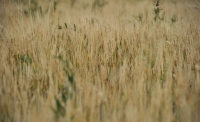
Feed refers to any material prepared for animal nutrition, whether it is a single substance, a blend of materials, a manufactured or semi-manufactured product, a raw material, or a component used in the preparation, processing, or production of feed. These materials may originate from authorized plant or animal sources, or aquatic organisms. Feed products in the Kingdom of Saudi Arabia are diverse. According to the 'Feed Product Registration Guide,' they include: - Raw feed: These are...
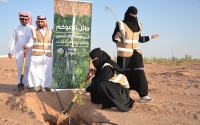
The Initiative to Develop Preparedness for Drought and Mitigate its Severity is an initiative launched by the National Center for Vegetation Cover Development and Combating Desertification in the Kingdom of Saudi Arabia on September 27, 2022, as one of the National Transformation Program initiatives to achieve Saudi Vision 2030 . The initiative is part of the targets of the Saudi Green Initiative and the Kingdom’s efforts to reduce the damages of desertification and drought by increasing affo...
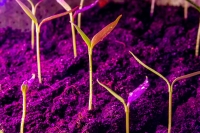
Modern agricultural technologies in the Kingdom of Saudi Arabia play a crucial role in advancing the nation’s agricultural sector in alignment with the Saudi Vision 2030 . These technologies encompass various methods and approaches. Below are three key modern agricultural technologies currently implemented in the Kingdom: 1. Hydroponics technology: It is a modern farming method that grows plants without soil, or by using a medium such as mineral wool. Key requirements include: - Automated con...
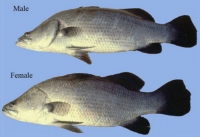
Asian Sea Bass Farming in the Kingdom of Saudi Arabia is the process of breeding and producing Asian sea bass or barramundi, which is considered one of the most widespread species in the Kingdom. Its farming has greatly expanded due to its suitability to the climate conditions. Beginnings of Asian sea bass farming in Saudi Arabia The Kingdom began farming this type of fish in 1998 at the Jeddah Fisheries Research Center, and commercial production started in 2006. The period since 2011 is con...
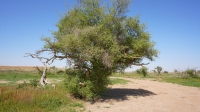
Logging in the Kingdom of Saudi Arabia involves human activities related to gathering firewood and producing charcoal, leading to the degradation of the Kingdom’s vegetation cover. This ecosystem is exposed to numerous environmental challenges, such as low rainfall, drought conditions, extreme temperature fluctuations, and high solar radiation. Trees in Saudi Arabia Approximately 120 tree species grow in the Kingdom, with 80 percent of them located in the southern regions. These trees contrib...
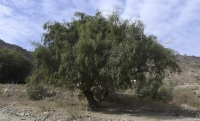
Albizia lebbeck (Mimosaceae), also known as dhaqn al-basha , is a shade plantain native to tropical and subtropical areas. It is cultivated in several sites in the Kingdom of Saudi Arabia , such as gardens, parks, outdoor areas, and sidewalks. Albizia lebbeck's description Albizia lebbeck is planted in the winter. It is a fast-growing tree whose height can range between twelve and twenty-five m. It features large and soft green leaves that undergo a nyctinastic movement during spring throu...
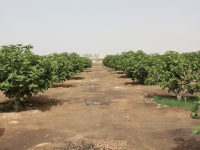
The Fig Tree (Ficus carica) is a small, falling-leaf tree of the Moraceae family. Its cultivation is widespread in the city of Riyadh , in the Kingdom of Saudi Arabia , in the private farms and gardens. It is a wild, fruitful, and medicinal plant. It is native to the Mediterranean basin, tropical areas, and sub-Mediterranean areas. Characteristics of the Fig Tree The Fig Tree is fast-growing. It grows up to a height of fifteen m and extends around twelve m. Its leaves are rough and fall in win...
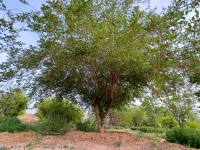
Black Mulberry Tree (Morus nigra) is a falling-leaf tree of the Moraceae family that is native to western Africa. They grow in temperate climates and can be cultivated in Riyadh , the Kingdom of Saudi Arabia . Their height ranges between six and fifteen m. They are topped with a dense canopy. They are often home to silkworms as their main source of food. These trees also attract birds and bees. Black mulberry trees are adorned with dark green leaves that are cottony underneath, growing alternat...
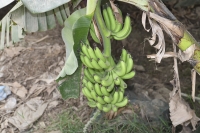
Sweet Banana (Mawz) is a herbaceous plant of the Musaceae family. It is a fast-growing, evergreen, and perennial plant. Its flowers are yellow. It has a strong and sweet aroma. It blooms year-round. It is cultivated in the Kingdom of Saudi Arabia for landscaping in private gardens or public parks. Sweet banana characteristics Sweet banana is the largest herbaceous plant in the world. However, it is erroneously considered a tree. The banana corm is a pseudostem formed of leaves and blades. It ca...
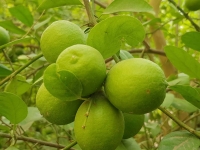
Lemon trees (Citrus Medica) are evergreen trees of the Rutaceae family. It is cultivated in some areas of the Kingdom of Saudi Arabia , but it is native to southeast Asia. Lemon tree growth The height of a lemon tree ranges between three and seven m. Its branches extend between three and nine m. Its fruits grow to a size ranging between seven and twelve cm. From September through October, they bloom into white and purple flowers of a size ranging between one and two cm. The lemon tree is tolera...
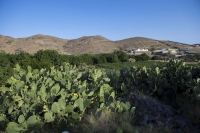
Prickly Pear (Opuntia ficus-indica), also known as the Indian fig or Sabbar , is a plant known by multiple names in Arabic, such as the Indian fig, spiny fig, and Sabbar. It is part of the Cactaceae family and is native to tropical areas, the Mediterranean basin, and subtropical areas. It grows in the Kingdom of Saudi Arabia . Prickly pear description A prickly pear is formed of oblong, pear-shaped paddles that grow atop each other to form a main stem. Prickly pears bear no wooden branches. Rat...
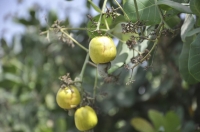
Guava Shrubs (Psidium guajava) are evergreen shrubs with prominent leaves facing each other on the branches. Upon blooming in the spring, it turns into a cultivated plant . It can be planted in Riyadh City , the Kingdom of Saudi Arabia . Guavas are typical Myrtoideae originating in South America. They have spread to all warm regions of the world and are cultivated in the Mediterranean and semi-tropical areas. It thrives in high humidity conditions, with low maintenance care. Guavas are deemed p...